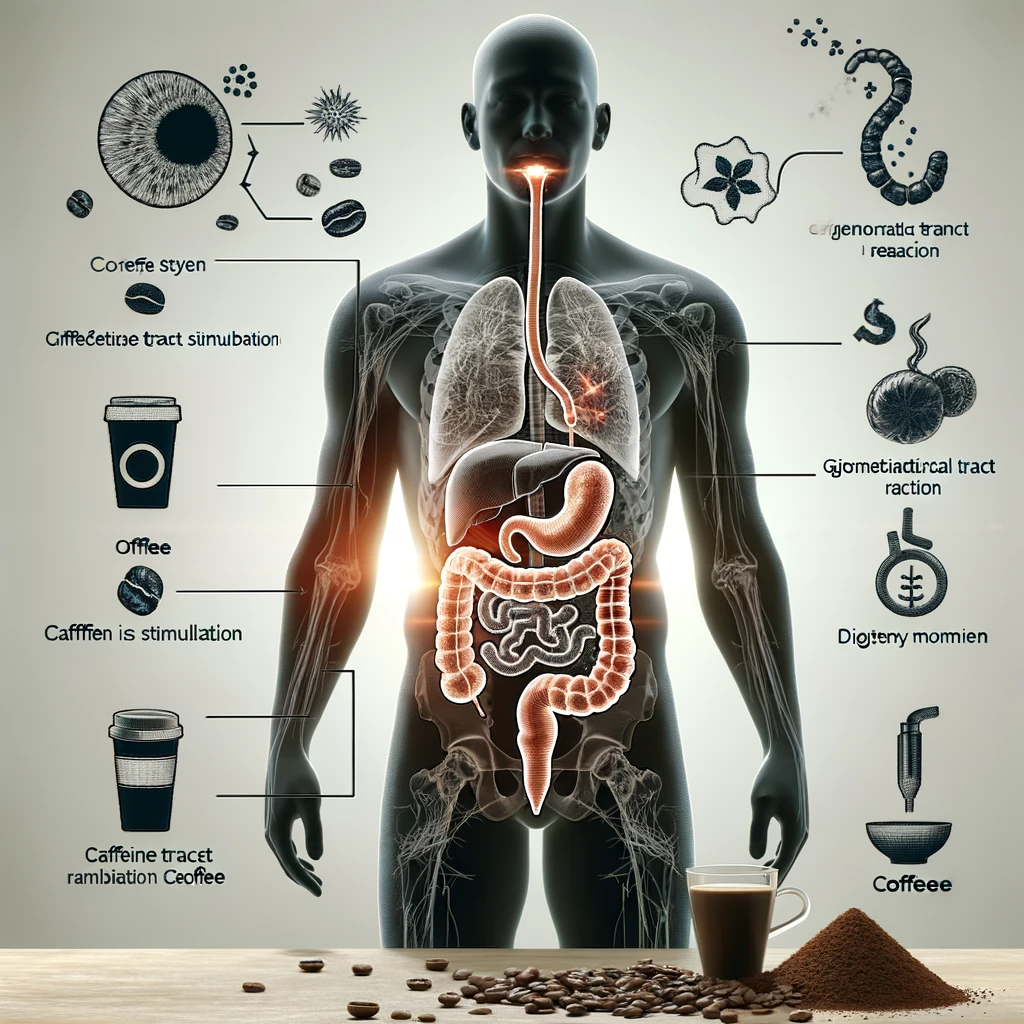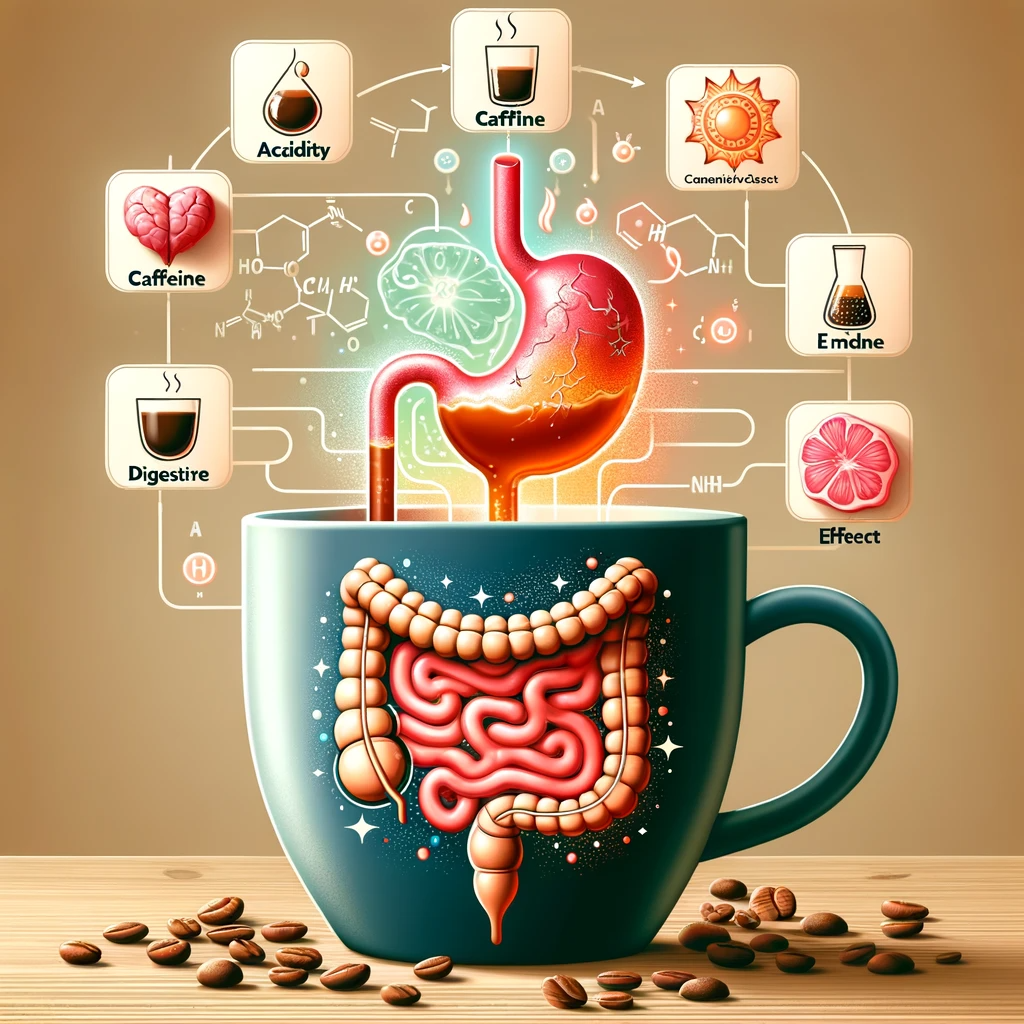Introduction
Coffee is a beloved morning ritual for many individuals, providing a much-needed energy boost to kickstart the day. However, for some people, their morning cup of joe can lead to an uncomfortable and inconvenient consequence: diarrhea. Understanding the potential causes of coffee-induced diarrhea is crucial in order to manage and prevent this digestive issue. This article will explore common factors that can contribute to diarrhea after consuming coffee, including caffeine sensitivity, the acidity of coffee, lactose intolerance, and irritable bowel syndrome (IBS). By identifying the underlying cause, individuals can make informed decisions about their coffee consumption and implement strategies to minimize digestive discomfort. Let’s delve into the potential reasons behind why coffee can lead to diarrhea.
Overview Of Coffee-induced Diarrhea
Coffee-induced diarrhea refers to the occurrence of loose, watery bowel movements after consuming coffee. It is a common digestive complaint experienced by some individuals. Diarrhea may occur shortly after drinking coffee or even hours later. This gastrointestinal symptom can be highly bothersome and inconvenient for those affected. Several factors contribute to coffee-induced diarrhea, including caffeine sensitivity, the acidity of coffee, lactose intolerance, and irritable bowel syndrome (IBS). Caffeine stimulates the colon, leading to increased bowel movements.
Additionally, the acidity in coffee can irritate the gastrointestinal lining, triggering diarrhea. Some individuals may also experience diarrhea due to lactose intolerance, as coffee often contains milk or cream. Lastly, individuals with IBS may be more susceptible to coffee-induced diarrhea due to increased sensitivity in the digestive system. Understanding these potential causes is crucial for managing and preventing coffee-induced diarrhea.
Importance Of Identifying Potential Causes
Identifying the potential causes of coffee-induced diarrhea is crucial for individuals experiencing this digestive issue. Understanding the underlying factors can help in managing and preventing discomfort. By pinpointing the specific cause, individuals can make informed choices about their coffee consumption and adjust their diet accordingly.
Being aware of caffeine sensitivity allows individuals to moderate their caffeine intake or switch to decaffeinated coffee. Recognizing the role of coffee acidity and gastrointestinal irritation can lead to choosing less acidic coffee options or adjusting brewing methods. Identifying lactose intolerance helps individuals avoid milk or cream in their coffee or opt for lactose-free alternatives. For those with irritable bowel syndrome (IBS), recognizing the connection between IBS and coffee can lead to finding personalized strategies for managing symptoms.
By understanding the potential causes of coffee-induced diarrhea, individuals can make informed decisions and take steps to alleviate discomfort and improve their overall digestive health.
Caffeine Sensitivity
One potential cause of coffee-induced diarrhea is caffeine sensitivity. Caffeine, a natural stimulant found in coffee, can have a stimulating effect on the digestive system. People with caffeine sensitivity may experience an increased urge to have a bowel movement after consuming coffee.
Caffeine acts as a diuretic, increasing the frequency of urination and potentially causing dehydration, which can contribute to loose stools. Additionally, caffeine can stimulate the muscles in the gastrointestinal tract, leading to increased contractions and bowel movements.
If someone suspects they have caffeine sensitivity, it is recommended that they moderate their caffeine intake or switch to decaffeinated coffee to avoid digestive discomfort. By understanding and managing caffeine sensitivity, individuals can minimize the risk of coffee-induced diarrhea and enjoy their coffee without digestive issues.
Explanation Of Caffeine’s Impact On Digestion
Caffeine, a natural stimulant found in coffee, can have a significant impact on digestion. When consumed, caffeine stimulates the muscles in the gastrointestinal tract, leading to increased contractions and bowel movements. This can result in an increased urge to have a bowel movement after consuming coffee. Additionally, caffeine acts as a diuretic, increasing the frequency of urination and potentially causing dehydration. Dehydration can contribute to loose stools and diarrhea.
Moreover, coffee’s acidity can also irritate the gastrointestinal lining, further exacerbating digestive issues. It is important to understand caffeine sensitivity and its potential impact on digestion in order to manage coffee-induced diarrhea effectively. By moderating caffeine intake or switching to decaffeinated coffee, individuals can minimize these effects and enjoy their coffee without experiencing digestive discomfort.
How Caffeine Sensitivity Can Lead To Diarrhea
Caffeine sensitivity can lead to diarrhea due to its stimulant effects on the gastrointestinal tract. When individuals with caffeine sensitivity consume coffee or other caffeinated beverages, it can cause excessive contraction of the muscles in the digestive system, leading to increased bowel movements and loose stools. Additionally, caffeine acts as a diuretic, increasing urination and potentially causing dehydration. Dehydration can further contribute to diarrhea. The irritant effects of caffeine on the gastrointestinal lining can also trigger digestive discomfort and diarrhea. Therefore, individuals with caffeine sensitivity may experience an increased urge to have a bowel movement and loose stools after consuming coffee. They need to moderate their caffeine intake or switch to decaffeinated alternatives to manage these symptoms effectively.
Acidity And Irritation
Coffee’s high acidity can contribute to digestive issues and irritation in some individuals. The acidic nature of coffee can stimulate the bowels, leading to an increase in bowel movements and potentially causing diarrhea. This effect can occur with both caffeinated and decaffeinated coffee, as both contain chlorogenic acid, which triggers higher stomach acid levels and the production of gastric acid. The increased acidity can irritate the gastrointestinal lining, leading to discomfort and digestive issues. Additionally, certain compounds in coffee, such as catechols and N-nitroso compounds, have been found to irritate the digestive system and contribute to gastrointestinal symptoms. It is important for individuals experiencing coffee-induced diarrhea to consider the acidity of their coffee and potentially switch to lower-acid coffee options or limit their consumption to manage their symptoms effectively.
Coffee’s Acidity And Its Effect On The Digestive System
Coffee’s high acidity can have a significant impact on the digestive system. The acidic nature of coffee stimulates the production of gastric acid, leading to increased stomach acid levels. This can irritate the gastrointestinal lining, resulting in discomfort and digestive issues. The acidity of coffee can also trigger an increase in bowel movements, potentially causing diarrhea. Both caffeinated and decaffeinated coffee contain chlorogenic acid, which contributes to the higher acidity levels. Coffee’s acidity can be especially problematic for individuals with sensitive stomachs or certain conditions like acid reflux or gastritis. It is essential for those experiencing coffee-induced diarrhea to consider the acidity of their coffee and explore lower-acid options to manage their symptoms effectively.
Gastrointestinal Irritation Caused By Coffee
Gastrointestinal irritation caused by coffee can contribute to diarrhea. The high acidity of coffee stimulates the production of gastric acid, leading to increased levels of stomach acid. This acidity can irritate the gastrointestinal lining, resulting in discomfort and digestive issues. Both caffeinated and decaffeinated coffee contain chlorogenic acid, which contributes to the higher acidity levels. For individuals with sensitive stomachs or conditions like acid reflux or gastritis, the acidity of coffee can be particularly problematic. Managing coffee-induced gastrointestinal irritation may involve exploring lower-acid coffee options or alternatives, such as herbal teas. It is important for individuals experiencing coffee-related diarrhea to pay attention to the acidity of the coffee they consume and make adjustments accordingly.
Lactose Intolerance
Lactose intolerance, a common digestive disorder, can contribute to coffee-induced diarrhea. Lactose, a sugar found in dairy products, can be difficult for some individuals to digest due to a deficiency or absence of lactase, the enzyme responsible for breaking down lactose. When lactose is not properly digested, it can lead to gastrointestinal symptoms such as diarrhea, bloating, and stomach cramps. Coffee, especially if cream or milk is added, can exacerbate these symptoms in individuals with lactose intolerance. To manage lactose intolerance while consuming coffee, individuals can opt for lactose-free milk or dairy alternatives, such as almond or soy milk. It is also recommended to pay attention to the lactose content of coffee creamers or sweeteners that may be added to coffee.
Connection Between Lactose Intolerance And Coffee-induced Diarrhea
Lactose intolerance, a common digestive disorder, can contribute to coffee-induced diarrhea. Individuals with lactose intolerance have difficulty digesting lactose, a sugar found in dairy products, due to a deficiency or absence of lactase, the enzyme responsible for breaking down lactose. When lactose is not properly digested, it can lead to gastrointestinal symptoms such as diarrhea, bloating, and stomach cramps. Coffee, especially if cream or milk is added, can exacerbate these symptoms in individuals with lactose intolerance. To manage lactose intolerance while consuming coffee, individuals can opt for lactose-free milk or dairy alternatives, such as almond or soy milk. It is also recommended to pay attention to the lactose content of coffee creamers or sweeteners that may be added to coffee.
Ways To Manage Lactose Intolerance While Consuming Coffee
Individuals with lactose intolerance can still enjoy coffee while managing their symptoms. Here are some ways to do so:
- Opt for lactose-free milk: Lactose-free milk is a great alternative to traditional dairy milk. It contains the same nutrients and taste without the lactose.
- Choose dairy alternatives: Almond milk, soy milk, and other dairy-free alternatives can be used in coffee instead of regular milk. These options are usually lactose-free and provide a creamy texture.
- Be mindful of non-dairy creamers: Some non-dairy creamers may still contain lactose or milk derivatives. Check the ingredients list to ensure they are lactose-free.
- Gradually introduce lactase supplements: Lactase supplements, which contain the enzyme needed to break down lactose, can help individuals with lactose intolerance digest small amounts of lactose. Start with a low dose and gradually increase as needed.
By incorporating these strategies, individuals with lactose intolerance can enjoy their favorite coffee without experiencing diarrhea or other digestive symptoms.
Irritable Bowel Syndrome (IBS)
Irritable Bowel Syndrome (IBS) is a common digestive disorder that certain foods and beverages, including coffee, can trigger. People with IBS may experience symptoms such as abdominal pain, bloating, and changes in bowel movements. The exact cause of IBS is unknown, but it is believed to involve a combination of factors, including muscular dysfunction in the intestines and sensitivity to certain foods or stress. For some individuals with IBS, coffee can act as a trigger, possibly due to its caffeine content or additives like dairy creamer or artificial sweeteners. Managing IBS and coffee consumption involves identifying personal triggers and making dietary adjustments, such as choosing decaffeinated coffee or alternative beverages.
Explanation Of IBS And Its Link To Coffee-related Symptoms
IBS, or Irritable Bowel Syndrome, is a common digestive disorder characterized by symptoms such as abdominal pain, bloating, and changes in bowel movements. While the exact cause of IBS is unknown, it is believed to involve a combination of factors, including muscular dysfunction and sensitivity to certain foods or stress. For some individuals with IBS, coffee can act as a trigger for their symptoms. The caffeine content in coffee can stimulate the intestines and increase gut motility, leading to diarrhea and other digestive issues. Additionally, additives like dairy creamer or artificial sweeteners in coffee may further exacerbate symptoms for those with IBS. Individuals with IBS need to pay attention to their body’s response to coffee and make necessary dietary adjustments to manage their symptoms effectively.
Managing IBS And Coffee Consumption
When it comes to managing IBS and coffee consumption, individuals with the condition need to pay attention to their body’s response to coffee. While some people with IBS may need to avoid coffee altogether, others may find that they can tolerate certain types or preparation methods. Switching to decaffeinated coffee or opting for lower caffeine content options may help reduce the risk of triggering IBS symptoms. Additionally, avoiding additives like dairy creamer or artificial sweeteners in coffee can also be beneficial for individuals with IBS. It’s best to experiment and find what works best for each individual’s unique needs and sensitivities. Consulting with a healthcare professional or registered dietitian can guide you in managing IBS symptoms while still enjoying coffee.
Conclusion
In conclusion, coffee-induced diarrhea can result from various factors, including caffeine sensitivity, acidity and irritation, lactose intolerance, and irritable bowel syndrome (IBS). For individuals experiencing coffee-related digestive issues, it is important to identify the potential cause and make necessary adjustments. This may include switching to decaffeinated coffee, managing lactose intolerance by using lactose-free alternatives or taking lactase supplements, and being mindful of coffee consumption for those with IBS. Each individual’s response to coffee may vary, so it’s important to listen to the body and make decisions accordingly. Consulting with a healthcare professional or registered dietitian can provide personalized guidance in managing coffee-induced diarrhea. With careful attention and modifications, it is possible to enjoy coffee without experiencing digestive discomfort.
Summary Of Potential Causes Of Coffee-induced Diarrhea
Various factors can cause coffee-induced diarrhea. One potential cause is caffeine sensitivity, where the stimulant effect of caffeine can speed up bowel movements and cause loose stools. Another factor is the acidity of coffee, which can irritate the gastrointestinal tract and lead to diarrhea. Lactose intolerance can also contribute to coffee-induced diarrhea, as many coffee beverages contain milk or cream. Lastly, individuals with irritable bowel syndrome (IBS) may experience diarrhea as a result of coffee consumption, as it can trigger symptoms in some people. It is important for individuals experiencing coffee-related digestive issues to identify the potential cause and make necessary adjustments to manage their symptoms.
Tips For Individuals Experiencing Coffee-related Digestive Issues
For individuals experiencing coffee-related digestive issues, several tips can help manage symptoms:
- Gradually reduce coffee consumption: Start by reducing the amount of coffee consumed or switching to decaffeinated options to see if symptoms improve.
- Experiment with alternative beverages: Try substituting coffee with herbal teas or other non-caffeinated drinks to see if it reduces digestive issues.
- Limit additives: Avoid adding creamers, milk, or sugar to coffee, as they can exacerbate digestive problems, especially for those with lactose intolerance.
- Keep a food diary: Keep track of what you eat and drink, including coffee, to identify any patterns between your coffee consumption and digestive symptoms.
- Stay hydrated: Drink plenty of water throughout the day to help regulate bowel movements and support digestion.
- Consider digestive supplements: Consult with a healthcare professional to determine if probiotics or digestive enzymes may be beneficial in managing coffee-induced diarrhea.
By implementing these tips, individuals can better manage their coffee-related digestive issues and reduce the likelihood of experiencing diarrhea. Remember to listen to your body and make necessary adjustments to find what works best for you.
Frequently Asked Questions about Why Does Coffee Give Me Diarrhea
Q: Why does coffee give me diarrhea?
A: There can be several reasons why coffee might be causing you to experience diarrhea. It is not uncommon, and several factors contribute to this gastrointestinal response.
Q: Is coffee a known diuretic?
A: Yes, coffee is considered to be a diuretic due to its caffeine content. It can stimulate the bladder and increase urine production. However, this diuretic effect does not directly cause diarrhea.
Q: What is it in coffee that causes diarrhea?
A: While coffee itself does not inherently cause diarrhea, it contains several substances that can potentially trigger this gastrointestinal problem. Caffeine, certain oils, acids, and other compounds found in coffee can irritate the digestive system.
Q: Can caffeine alone cause diarrhea?
A: Caffeine, when consumed in large amounts, can have a laxative effect on some individuals. However, for most people, it is the combination of caffeine with other compounds in coffee that contributes to digestive disruption.
Q: Does the type of coffee I drink matter?
A: Yes, the type of coffee you consume can play a role. Dark or highly roasted blends tend to have higher amounts of potentially irritating compounds, making them more likely to cause reactive symptoms in sensitive individuals.
Q: Can coffee acidity contribute to diarrhea?
A: Yes, the natural acidity of coffee can increase the production of stomach acid, leading to digestive upset and potentially causing diarrhea. Those with sensitive stomachs or certain gastrointestinal conditions may be more prone to this effect.
Q: Can coffee intolerance cause diarrhea?
A: Yes, some individuals may have a coffee intolerance or sensitivity. When consumed, coffee can trigger an inflammatory response in the gut, leading to symptoms like diarrhea, bloating, and abdominal discomfort.
Q: Could it be something I add to my coffee?
A: Yes, additives such as milk, cream, or artificial sweeteners that you add to your coffee may also trigger diarrhea. Lactose intolerance, milk protein allergies, or sensitivities to certain sugar substitutes could be the underlying causes.
Q: How can I alleviate coffee-induced diarrhea?
A: If you experience diarrhea after consuming coffee, you can try taking the following steps: reduce your coffee intake, switch to a low-acid or decaffeinated coffee, test for any specific food intolerances or sensitivities, and ensure proper hydration to counteract the diuretic effect.
Q: When should I consult a healthcare professional?
A: If your gastrointestinal symptoms persist or worsen, it is advisable to consult a healthcare professional. They can help determine the underlying cause and provide appropriate guidance or treatment options tailored to your specific needs.
Remember that individual responses to coffee can vary, and what causes diarrhea in one person may not affect another. Experimenting with different types of coffee, additives, or moderation of caffeine intake may help you find a solution that works for you.

Hey there! If you’re in need of a catchy social media description for the content by Steven Benton, the owner at Easy Mug Coffee, then look no further. Here’s a suggestion: “Welcome to the ultimate coffee haven! Join Steven Benton, the mastermind behind Easy Mug Coffee, as he takes you on a delightful journey through the world of coffee. This blog is a paradise for all coffee lovers out there, so get ready to brew, sip, and savor every moment with us!” Let me know if there’s anything else I can help you with!



